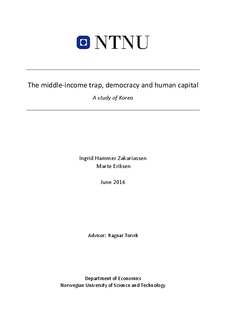The middle-income trap, democracy and human capital : a study of Korea
Master thesis
Permanent lenke
http://hdl.handle.net/11250/2407523Utgivelsesdato
2016Metadata
Vis full innførselSamlinger
Sammendrag
In this thesis, we examine factors that are important for a country to escape or avoid a middle-income trap, and whether democracy and human capital are necessary conditions for a country to achieve high economic growth. We use results from two economic models; one by Wang (2016), and the second by Saint-Paul and Verdier (1992), and extend the latter to include the decision to democratize as an endogenous variable. From the extended model, we conclude that a high level of human capital in the population, investment in education and a relatively equal income distribution increases the probability of democratizing. Wang concludes that a country will democratize if the private sector capital is larger than the state sector capital. In both models, the economic growth rate will be higher in a democracy than in an authoritarian regime. We compare the evidence from Korea with the extended model by Saint-Paul and Verdier and the model by Wang, and find that these models are consistent with the empirical evidence. However, the models do not include all aspects that may have been important in the democratization process in Korea, which invested extensively in R&D and education, and experienced pressure to democratize from the international market and by collective actions in the population. Our analyses indicate that democracy induce higher economic growth, which may have prevented Korea from being caught in a middle-income trap.
